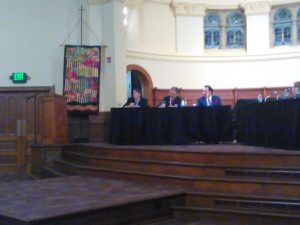College hosts Democratic primary election forum
The Center for Political Participation and Meadville Tribune hosted a forum for the candidates running in Pennsylvania’s 16th Congressional District’s Democratic primary election. The three candidates, Chris Reiger, Ronald DiNicola and Rob Multari, discussed their plans for topics such as healthcare, the economy and school safety.
Rieger, a bankruptcy lawyer from the Pittsburgh area, started by explaining why he decided to run in the election.

Candidates in Pennsylvania’s 16th Congressional District’s Democratic primary election Chris Rieger, Ronald DiNicola and Rob Multari attend the forum held in Ford Memorial Chapel on Monday, April 16, 2018.
“I believe that the whole point, the overriding purpose of public service is to help people, plain and simple,” Rieger said. “And the opportunity to represent some 700,000 of my fellow citizens in Washington would be an enormous honor, to help a clientele of not hundreds, but hundreds of thousands.”
Rieger said he wanted to counteract some of the policies of President Donald Trump’s administration, which he referred to as “destructive.”
“Gutting the Consumer Financial Protection Bureau. Seeking to chip away various labor protections that were enforced under the prior administration. And seeking to rip away health insurance from millions of Americans last year. It is immoral,” Rieger said.
DiNicola, a lawyer from Erie, said his upbringing as the child of Italian immigrants gives him an important perspective when he approaches his job.
“I identify and appreciate that we need a government that will understand the needs of working families who are struggling to provide opportunity and education for their children, and who are struggling to make ends meet. The middle class that feels beset upon by the rest of the system that’s gamed against them by a Congress that is dominated by money that through politics influences policy, and is unable to really address the needs of our country,” DiNicola said.
Multari, a doctor from Farrell, Pa., said he has watched the district go through substantial economic declines during his lifetime. He said while he was young, he was able to live a sort of American dream of hard work leading to economic opportunity.
“In the past 37 years, as I’ve practiced medicine, I’ve watched that American dream disappear from the 16th District,” Multari said. “The 16th District has lost jobs and lost population and lost income in that period of time, and those are some of the reasons why I’ve chosen to run for Congress.”
The candidates discussed their views on Representative Mike Kelly, the current officeholder of Pennsylvania’s 16th Congressional seat.
“I believe our current incumbent does not meet with constituents face-to-face anymore,” Rieger said. “And in my judgement, if you’re not willing to meet with those you mean to represent in Washington, or Harrisburg or wherever else face-to-face, then in my judgement, you’re not going to be able to represent them very well.”
DiNicola said he felt many of Crawford County’s difficulties were common to other areas of western Pennsylvania.
“Are we going to be able to take the rich industrial history of Crawford County and the rich agricultural history of Crawford County, and blend that into a viable, strong economic model that will continue to allow this county to rebound and to prosper?” DiNicola asked.
DiNicola said investment in education is an important part of such economic program. He suggested the creation of a comprehensive community college system in western Pennsylvania, as well as expansion of programs such as Social Security to make it easier for people to go through job training programs.
“We need to marry those programs with real hope and opportunity so we are not a caretaker nation, but we provide opportunity to those who are able to become skilled, create economic opportunity, job, opportunities, that all ties into education,” DiNicola said. “And it requires us to have a commitment to building that incentive to take people off of the rolls and put them into jobs where they can be productive members of society. That always has to be our goal. And I think we’re falling short of that because we’re leaving them without hope.”
In light of the school shooting in Parkland, Florida, the candidates were asked about how they would work to prevent such incidents in the future while still upholding the constitutional right to bear arms.
Rieger said the biggest problem in the gun debate was the inability of people to separate the ideas of fundamental and absolute rights. He said while the rights provided in the United States Constitution were fundamental, no right is absolute.
“The right to vote is a fundamental right but it is not absolute,” Rieger explained. “ In many jurisdictions, if you commit many felonies you lose your right to vote. The Second Amendment right is a fundamental right. There’s a right embedded in our Constitution that gives citizens a right to protect themselves from others, but it is not absolute. And this is also a legal question, but this is also a moral question.”








